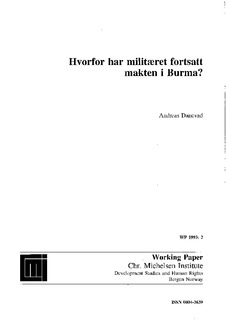Hvorfor har militæret fortsatt makten i Burma?
| dc.contributor.author | Danevad, Andreas | |
| dc.date.accessioned | 2008-03-12T11:16:14Z | |
| dc.date.accessioned | 2017-03-29T09:12:49Z | |
| dc.date.available | 2008-03-12T11:16:14Z | |
| dc.date.available | 2017-03-29T09:12:49Z | |
| dc.date.issued | 1993 | |
| dc.identifier.issn | 0804-3639 | |
| dc.identifier.uri | http://hdl.handle.net/11250/2435941 | |
| dc.description.abstract | This paper seeks to explain why the military has remained in power in Burma after the country-wide uprising for democracy in 1988. It is argued that a theoretical approach has to include a focus on the particular actors and the processes of action, complimentary to structural factors. It is in the concluding section suggested how a more comprehensive analysis has to include the historical role of the military and political culture. | |
| dc.language.iso | nor | |
| dc.publisher | Chr. Michelsen Institute | |
| dc.relation.ispartofseries | CMI Working paper | |
| dc.relation.ispartofseries | WP 1993: 2 | |
| dc.subject | Democratization | |
| dc.subject | Political development | |
| dc.subject | Authoritarianism | |
| dc.subject | Myanmar | |
| dc.subject | Burma | |
| dc.title | Hvorfor har militæret fortsatt makten i Burma? | |
| dc.type | Working paper |
Files in this item
This item appears in the following Collection(s)
-
Bora-import [434]
